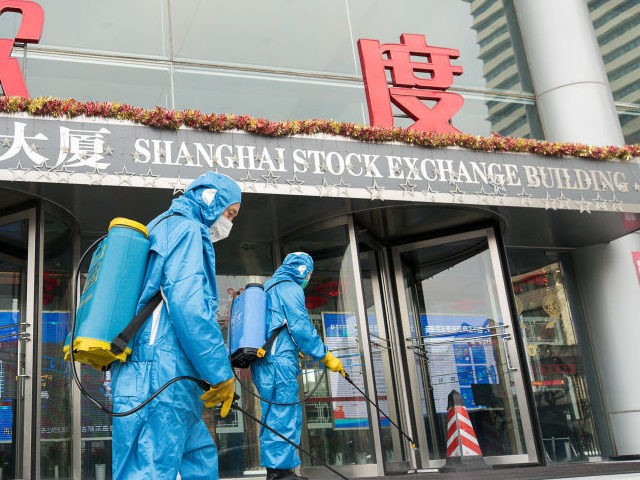China’s state-run Global Times on Monday stated explicitly what outside observers assume about the Shanghai lockdown: the city is undergoing a special two-phase scaled-back version of China’s “dynamic zero-Covid” lockdown policy because Shanghai is simply too large, rich, and important to shutter completely.
The Global Times presented Shanghai as the next logical evolution of “dynamic zero-Covid,” a catchphrase popular with the Chinese government that has always boiled down to “as much lockdown as we think we can get away with.”
This approach is supposedly superior to the rest of the world’s decision to live with Chinese coronavirus and handle it like most other infectious diseases, especially now that the virulent but apparently less dangerous omicron variant is prevalent and vaccines have greatly reduced the risk of hospitalization and death.
The Global Times extolled Shanghai’s flexible “closed-off management” and testing approach, which leaves much of the city’s infrastructure running and imposes only a “brief hiatus” upon manufacturers, as a “very different” approach from the lockdowns imposed on cities like Shenzhen. The article carefully avoided mentioning the utterly nightmarish quarantine imposed on Xi’an in January.
“Shanghai is not just the largest city in China, but also the world’s leading economic, financial, shipping and trade center… It is not exaggeration to say that if Shanghai were put under citywide, strict closed-off management, the results will cascade into a significant negative impact on the whole Chinese economy as well as certain aspects of the global economy,” the Global Times wrote – an argument that might not rest easily in the ears of those who lived through the Xi’an horror show.
The article concluded by presenting Shanghai as a laboratory for perfecting “dynamic zero-Covid” snap lockdowns:
To a great extent, Shanghai’s pursuit of a more cost-efficient approach is in sync with the practical needs of the Chinese economy. For China, what is most important now is how to prevent the epidemic from excessively affecting the economy, while striving to achieve the greatest prevention and control effect. In this regard, Shanghai’s performance will be of great significance for the entire Chinese economy and the country’s anti-epidemic efforts this year in terms of minimizing disruptions to normal social and economic activities.
According to the New York Times (NYT) on Tuesday, the lab rats of Shanghai are considerably less pleased with their situation than the Global Times made them out to be:
Residents raced to hoard groceries in case they were ordered to stay home. Some protested at the gates of housing complexes that were locked with little notice. Others, sent to government isolation facilities, were forced to sleep on the floor because of a shortage of beds.
For still others, the city’s Covid-19 restrictions have had life-threatening implications. Some residents have been confined at home, unable to get kidney dialysis or other urgent treatment. A nurse who suffered an asthma attack died after she was denied care by a hospital that cited Covid prevention protocols.
The two-phase split-city approach lauded by the Global Times as a reasonable approach to Shanghai’s unique challenges was confusing and frightening for residents in the NYT’s telling.
One resident allegedly emerged from a five-day neighborhood lockdown to behold what she described as an “apocalyptic scene” as the two-stage citywide shutdown began. A viral video captured people locked involuntarily inside their apartment building by the authorities for three days, pleading for their freedom.
“While the authorities have been quick to enforce isolation and home quarantine on residents, they have lagged in ensuring that all those in confinement can get help for serious medical conditions. Many residents have resorted to going online to beg for access to treatment such as dialysis,” the NYT grimly observed.
A growing number of Chinese are reportedly saying the central government should abandon its lockdown strategy in the face of the highly contagious omicron variant. Some saw the Shanghai quarantine touted by the Global Times as shameful and poorly planned.

COMMENTS
Please let us know if you're having issues with commenting.